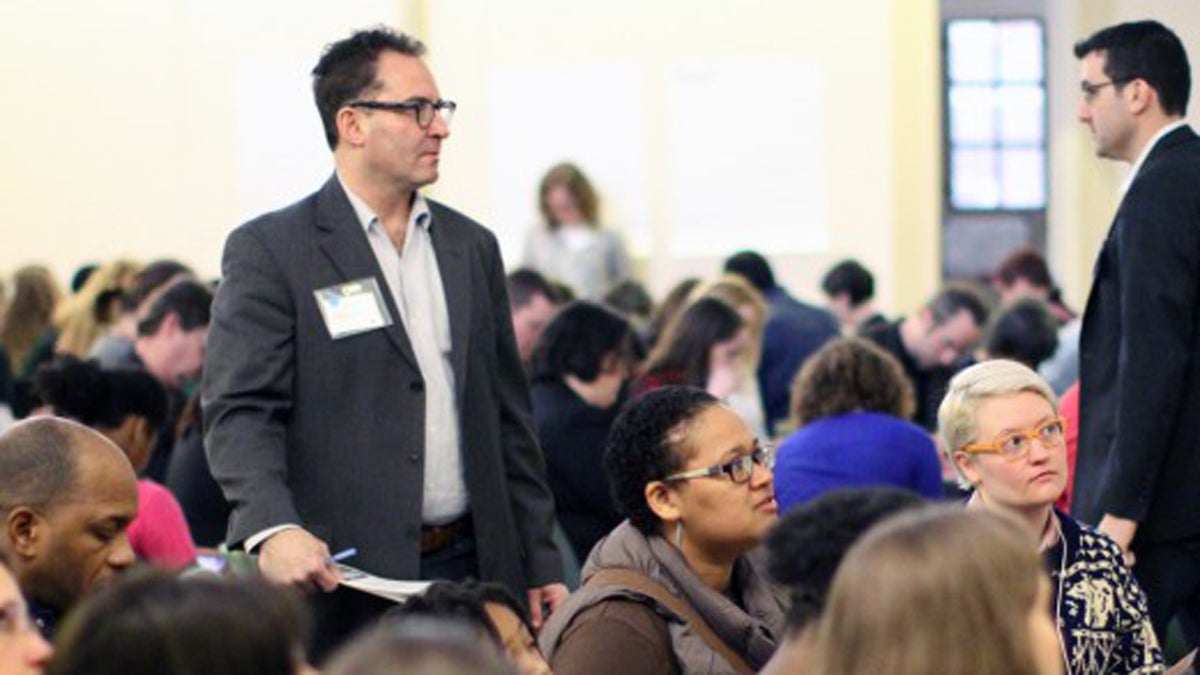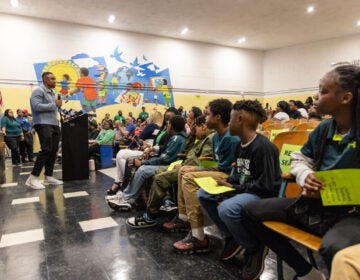Philadelphia ‘friends of’ groups band together to support neighborhood schools

Jeff Hornstein, co-chair of the Philadelphia Crosstown Coalition Education Committee and president of the Queen Village Neighbors Association. (Lauren Summers/Philly School News)
Marketing and fundraising. These are just two things that the newly minted Friends of Neighborhood Public Education wants to do on behalf of Philadelphia’s neighborhood schools, which sometimes get a bad rap.
The idea for a network of friends of groups brewed in the minds of founders Ivy Olesh, Christine Carlson and Jeff Hornstein, months before the initial meeting. All three are active in the Philadelphia Crosstown Coalition’s Education Committee.
A couple of months ago, “We sent out an email to ten people we thought might be interested,” said Jeff Hornstein, president of the Queen Village Neighborhood Association and co-founder of the group. “Forty people showed up.”
In March, the group held a summit at the Friends Center at 15th and Cherry streets, drawing about 150 people on a rainy Saturday morning.
People from established friends of groups and those interested in starting one for their own showed up to hear workshops in four areas: how to start a friends of group, how to work with their principal, how to navigate the school district and planning for creating a city-wide advocacy strategy spread over five hours of a rainy Saturday.
Much like Home and School Associations – the Philadelphia equivalent of a Parent Teacher Association (PTA) – established friends of groups can bring in much needed resources and participate in strategic planning for a school.
“We’re the fundraising arm for the school and we’re also the PR arm for the school, ” said Ivy Olesh, founder of Friends of Chester A. Arthur (FOCA), an elementary school in Southwest Center City. “We make sure that the great things going on in the school make their way out into the community, so we get community buy-in, and make sure the resources of the community are making their way in.”
One example: FOCA recently brought in a $70,000 grant from the Lenfest Foundation for an afterschool program at the school.
As for marketing, the founders said it can be difficult to get parents to even consider their neighborhood school. Friends of groups work to get parents – and even realtors – into schools so that they can form their own opinions. “Once they go in the door of the school they’re going to find something they really like,” said Carlson.
The group is hoping to take that PR work city-wide and start mending some of the negative publicity caused by years or underfunding. “We hope to do some sort of PR campaign to rebuild the brand,” said Hornstein.
“This should be embarrassing to legislators.”
Some education advocates are skeptical of a piecemeal approach to help schools.
Bishop Dwayne Royster, executive director of POWER, a faith-based advocacy group which has focused on education funding, said his group tried to organize parents in some local schools about three years ago.
“We were going out after school… trying to talk with parents, gathering them in school groups and discovering from them what they felt like they could ask for,” said Royster. He said those organizing efforts often hit a brick wall: a lack of school funding. So the group set its sights on advocating for basic education funding statewide as a way to help all schools
“We should not need community groups raising funds for Philadelphia or any other school district across the state,” said Royster, on the fact that teachers and parents can end up paying for basic classroom supplies and filling gaps in school resources. “This should be embarrassing to legislators.”
Part of the conversation for both groups is how to reach schools without existing comunity networks. Communities with dwindling or aging populations also have different needs than those that make up the Center City neighborhoods leading the friends of group charge.
Juanda Myles, an 18-year veteran of Penrose Elementary in Southwest Philadelphia said she’d like to get involved in the group and is active in her neighborhood association, Friends of Eastwick Community. But she said that group has a number of concerns ahead of education on its agenda.
“We have economic development issues…We need senior housing…We have a lot of issues to address out there. And I guess we’ll get around to the schools,” said Myles.
Vicki Ellis, director of Strategic Partnerships for the School District of Philadelphia said the District is happy that the friends of groups are organizing and made a presentation on how to work with the District at the Saturday summit. But she said she is aware that friends of groups are not the norm at most schools.
“If you don’t have a strong HSA or Friends of group, you don’t have the capacity to raise funds,” said Ellis. But she say she hears members of Friends of Neighborhood Public Education acknowledging that helping only some schools is not fair. “It adds to the inequity,” said Ellis.
Part of banding together disparate groups, according to the founders, is to help spread their wealth and knowledge around.
“A huge loud voice [at the summit] was how do we build diversity and inclusion in this incipient movement,” said Hornstein. The groups is planning an outreach committee and a city-wide advocacy strategy to build on this desire for equity.
The Friends of Neighorhood Public Education is under the fiscal umbrella of the Philadelphia Crosstown Coalition, a network of civic associations.
Correction: An earlier version of this article incorrectly identified the Philadelphia Crosstown Coalition.
WHYY is your source for fact-based, in-depth journalism and information. As a nonprofit organization, we rely on financial support from readers like you. Please give today.




